Click the inductee’s name to learn more about them.
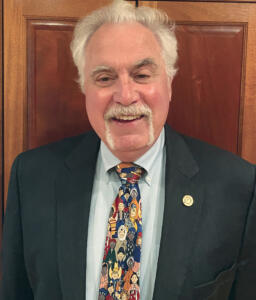
J. Barry Barker (2020)

Celia Kupersmith (2020)

Dr. Beverly Scott (2020)
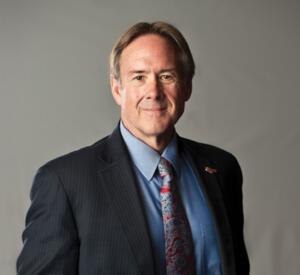
Paul Jablonski (2020)

Grace Crunican (2021)
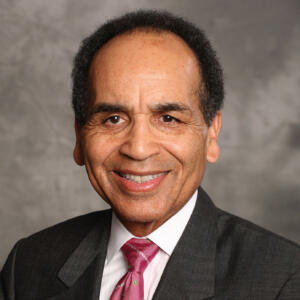
Delon Hampton, Ph.D., P.E. (2021)
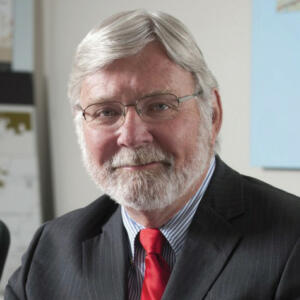
Arthur T. Leahy (2021)
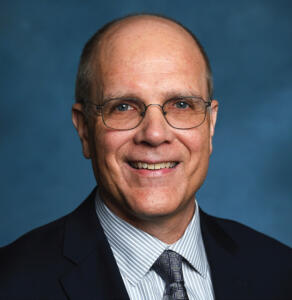
Stephen E. Schlickman (2021)
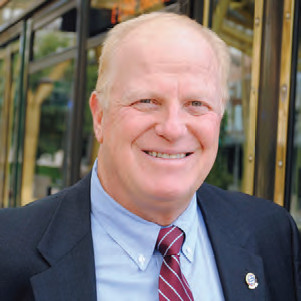
Joseph Calabrese (2022)

Mattie “M.P.” Carter (2022)
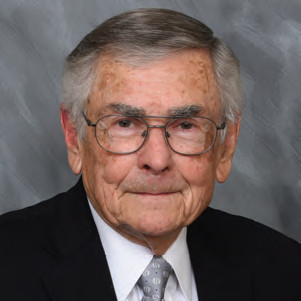
Jim Srygley (2022)

Gary C. Thomas (2022)

Michael Allegra (2023)
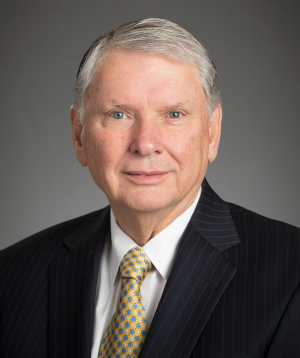
Paul J. Ballard (2023)
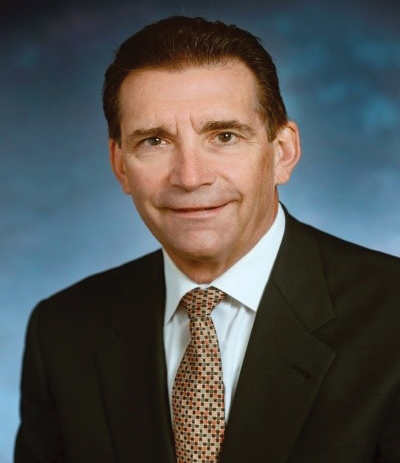
John P. Bartosiewicz (2023)

Julie Cunningham (2023)

Sharon Greene (2023)
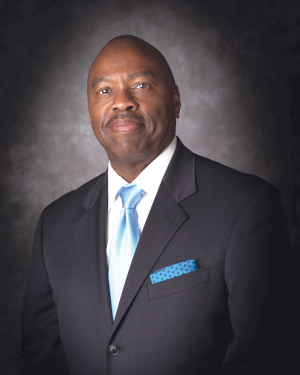
Phillip A. Washington (2023)
J. Barry Barker
 J. Barry Barker retired Dec. 1, 2018 after more than 40 years advancing public transportation at the national, state and local levels and nearly 25 years as executive director of the Transit Authority of River City in Louisville, KY. Throughout his long and distinguished career, Barker has held leadership roles on APTA’s board and many committees over 30 years. Upon his retirement, in a proclamation from APTA, he was cited for his “many significant accomplishments for public transportation and the customers we serve,” including his positions of chairman, Legislative Committee; vice chairman for Legislative Affairs; chairman, Sustainability Committee; and vice president, Marketing and Communications Committee.
J. Barry Barker retired Dec. 1, 2018 after more than 40 years advancing public transportation at the national, state and local levels and nearly 25 years as executive director of the Transit Authority of River City in Louisville, KY. Throughout his long and distinguished career, Barker has held leadership roles on APTA’s board and many committees over 30 years. Upon his retirement, in a proclamation from APTA, he was cited for his “many significant accomplishments for public transportation and the customers we serve,” including his positions of chairman, Legislative Committee; vice chairman for Legislative Affairs; chairman, Sustainability Committee; and vice president, Marketing and Communications Committee.
Celia Kupersmith
 For 34 years, Celia Kupersmith has been a major force in the growth and development of the public transit industry. To this day, multiple systems and riders alike benefit from her efforts to foster ethical leadership, improve service quality, enhance multimodal coordination, and elevate transit as a key network component. In predominantly multi-modal settings, she has served as a planner; marketing director; MPO chief; bus, rail, and ferry manager; general manager; and executive recruiting consultant. She has been very active in APTA throughout her long career. While working at the RTC in Reno, NV, she served as vice chair of APTA’s Small Operations Committee and, later, as vice chair of the Human Resources Committee within APTA’s Executive Committee. In that role, she led the effort to develop operational mechanics for Leadership APTA, ultimately serving for years as chair of that program. She remains involved as a member of the Human Resources Committee to this day.
For 34 years, Celia Kupersmith has been a major force in the growth and development of the public transit industry. To this day, multiple systems and riders alike benefit from her efforts to foster ethical leadership, improve service quality, enhance multimodal coordination, and elevate transit as a key network component. In predominantly multi-modal settings, she has served as a planner; marketing director; MPO chief; bus, rail, and ferry manager; general manager; and executive recruiting consultant. She has been very active in APTA throughout her long career. While working at the RTC in Reno, NV, she served as vice chair of APTA’s Small Operations Committee and, later, as vice chair of the Human Resources Committee within APTA’s Executive Committee. In that role, she led the effort to develop operational mechanics for Leadership APTA, ultimately serving for years as chair of that program. She remains involved as a member of the Human Resources Committee to this day.
Dr. Beverly Scott
 Dr. Beverly Scott is recognized as a trailblazer, a thoughtful and inspirational leader and a passionate advocate for the betterment of the public transportation industry through her efforts to ensure training and opportunities are made available to young and disadvantaged individuals, many of whom have gone on to become leaders in their own right. Scott has held key leadership roles in some of North America’s largest public transportation systems in Texas; New York, NY; New Jersey; Washington, DC; Rhode Island; California; Georgia; and Massachusetts. Her dedicated service to APTA dates to the earliest stages of her career. She has been a tireless advocate for the association and has served on many committees, including as APTA chair, chair of the Legislative Committee, Diversity Council and Award’s Committee, to name a few.
Dr. Beverly Scott is recognized as a trailblazer, a thoughtful and inspirational leader and a passionate advocate for the betterment of the public transportation industry through her efforts to ensure training and opportunities are made available to young and disadvantaged individuals, many of whom have gone on to become leaders in their own right. Scott has held key leadership roles in some of North America’s largest public transportation systems in Texas; New York, NY; New Jersey; Washington, DC; Rhode Island; California; Georgia; and Massachusetts. Her dedicated service to APTA dates to the earliest stages of her career. She has been a tireless advocate for the association and has served on many committees, including as APTA chair, chair of the Legislative Committee, Diversity Council and Award’s Committee, to name a few.
Paul Jablonski
 Through a career that spanned more than 40 years in the public transportation industry, Paul Jablonski was a champion for transit. His influence and expertise was felt at transit agencies across the east coast, the Midwest, the west coast and overseas. He nurtured new transit systems, turned broken systems into winners, and was committed to learning and sharing knowledge to help others succeed. Jablonski was deeply involved in APTA, serving as an at-large director on the APTA Board of Directors, co-chair for the Public Transportation CEO Coordinating Council Leadership and was a member of an additional 14 committees. Under his leadership, the San Diego Metropolitan Transit System won APTA’s Most Outstanding Transit Agency of the Year award in 2009. In 2014, APTA honored him as Outstanding Transportation Manager of the Year.
Through a career that spanned more than 40 years in the public transportation industry, Paul Jablonski was a champion for transit. His influence and expertise was felt at transit agencies across the east coast, the Midwest, the west coast and overseas. He nurtured new transit systems, turned broken systems into winners, and was committed to learning and sharing knowledge to help others succeed. Jablonski was deeply involved in APTA, serving as an at-large director on the APTA Board of Directors, co-chair for the Public Transportation CEO Coordinating Council Leadership and was a member of an additional 14 committees. Under his leadership, the San Diego Metropolitan Transit System won APTA’s Most Outstanding Transit Agency of the Year award in 2009. In 2014, APTA honored him as Outstanding Transportation Manager of the Year.
Grace Crunican
 Grace Crunican’s retirement as the general manager of Bay Area Rapid Transit (BART) in 2019 was the culmination of a four-decade pioneering transportation career. Grace’s career has steadily demonstrated how to build a more resilient, sustainable and equitable future for public transportation. Grace has always understood that public transit organizations need to be as varied as the communities they serve, and she continually ensured that women and minorities have a voice at the table.
Grace Crunican’s retirement as the general manager of Bay Area Rapid Transit (BART) in 2019 was the culmination of a four-decade pioneering transportation career. Grace’s career has steadily demonstrated how to build a more resilient, sustainable and equitable future for public transportation. Grace has always understood that public transit organizations need to be as varied as the communities they serve, and she continually ensured that women and minorities have a voice at the table.
Grace’s introduction to public transportation began in college where she served as a volunteer intern for Portland (OR) Mayor Goldschmidt. Her journey would take her to local, state and national positions. In addition to leading BART, she served as FTA Deputy Administrator; Director, Seattle Department of Transportation; Director, Oregon Department of Transportation; Director, Surface Transportation Policy Project; and Professional Staffer, Senate Transportation Appropriations Subcommittee.
Grace has always been a strong, tough leader who isn’t afraid to roll up her sleeves. She joined BART in 2011 when it was struggling to retain riders after the recession, and had just experienced a 5.5 percent drop in riders. Under her tenure, the number of riders grew 24 percent by 2015. She also shifted the agency’s focus from expansion efforts to reinvesting in its core infrastructure. She oversaw the procurement of BART’s $2.6 billion fleet of new train cars, and led the successful passage of Measure RR, a $3.5 billion bond measure to repair and upgrade BART’s aging infrastructure.
She was a champion for building programs and policies that provide avenues for the best talent to emerge. She launched the first BART Leadership Academy and Mid-Managers Training programs. Upon her retirement, the BART board renamed it the Grace Crunican Leadership Academy to honor her vision.
Grace has been actively involved in APTA for 30 years. She has served on the Board of Directors and the Executive Committee as well as many other committees including the Authorization Task Force, State Affairs Committee, and Diversity and Inclusion Committee and she has chaired the Awards Committee.
A longtime member and former chair of WTS, she is co-author of the book, Boots on the Ground, Flats in the Boardroom: Transportation Women Tell Their Stories.
Delon Hampton, Ph.D., P.E.
 Dr. Delon Hampton was a pioneer, particularly in advocating for further professionalizing engineering, by persuading more engineers to pursue graduate degrees. He also encouraged more minorities to pursue engineering as a career and to assume leadership responsibilities.
Dr. Delon Hampton was a pioneer, particularly in advocating for further professionalizing engineering, by persuading more engineers to pursue graduate degrees. He also encouraged more minorities to pursue engineering as a career and to assume leadership responsibilities.
Delon earned a BS in civil engineering from the University of Illinois-Champaign Urbana in 1954 and went on to earn a Master of Science and Ph.D. in civil engineering from Purdue University. His career spanned 25 years in academia, including professorships at Kansas State University and Howard University. He chronicled his experience and challenges as an African American in the engineering field in his autobiography, entitled, A Life Constructed, Reflections on Breaking Barriers and Building Opportunities, which was published in 2013.
In 1973, while a professor at Howard University, Delon founded Delon Hampton & Associates (DHA) located in Washington, DC, at a time when there were few black-owned engineering companies. Under his leadership, the company grew quickly. One of its first projects was the Navy Yard Station for the Washington Metropolitan Area Transit Authority. DHA earned a reputation for integrity, excellence and accountability and expanded to include offices in Atlanta, Los Angeles, Memphis, Champaign-Urbana, Silver Spring and Baltimore, and grew to nearly 250 employees at one point.
Delon advocated that people must give back to their professions. For that reason, he accepted leadership positions at professional organizations. He served on the Board of Directors and Executive Committee of APTA, chairing the Business Members Board of Governors. He also served as chair of the American Public Transportation Foundation. He was elected the first African American president of the American Society of Civil Engineers.
Delon recognized that an excellent education made a big difference in his life and therefore he made a $7.5 million gift to Purdue University to dedicate the Delon & Elizabeth Hampton Hall of Civil Engineering. The hall is dedicated to his aunt who raised him.
Delon’s legacy is realized through the countless students he inspired to become engineers, and the hundreds of notable projects by DHA around the country.
Arthur T. Leahy
 Art Leahy was born to serve in the transportation industry. Growing up in Los Angeles, Art’s parents both worked as rail car operators at the Southern California Rapid Transit District (RTD), later renamed LA Metro. When Art started college, he worked as a bus operator there. Thus began a lifelong journey in the public transportation industry—a remarkable journey of accomplishment.
Art Leahy was born to serve in the transportation industry. Growing up in Los Angeles, Art’s parents both worked as rail car operators at the Southern California Rapid Transit District (RTD), later renamed LA Metro. When Art started college, he worked as a bus operator there. Thus began a lifelong journey in the public transportation industry—a remarkable journey of accomplishment.
After graduating from college, Art moved out of the driver’s seat and took an entry-level job in the marketing department at RTD. Over a 25-year period, he moved up the ranks, eventually becoming the Chief Operating Officer.
Art got his first chance to lead a public transit organization in 1997 when he was named the general manager of Metro Transit in Minneapolis.
In 2001, he returned to California to become the Chief Executive Officer of the Orange County Transportation Authority (OCTA), where he revolutionized the bus program. He converted the fleet of 600 buses to natural gas and developed a “Putting Customers First” initiative. In 2005, OCTA was recognized as the “Outstanding Transportation System” by APTA. During his eight years at OCTA, ridership grew 22 percent.
In 2009, Art returned to the place where he started his career when he was hired as the Chief Executive Officer at LA Metro. In his six years there, he oversaw one of the largest public works programs in the country’s history. He secured billions of dollars in federal aid; five new rail lines started construction; and new Express Bus Services were implemented. All told, Art oversaw over $20 billion of transportation improvements during, and after, a deep economic recession.
In 2015, Art was named the Chief Executive Officer at the Southern California Regional Rail Authority (Metrolink). During his four years there, the agency became the first railroad in the country to install and implement positive train control. Art also secured almost $1 billion dollars in funding to revamp commuter rail service.
Art has received numerous accolades over his long career including being named the 2017 APTA Public Transportation Manager of the Year. But Art feels that his greatest accomplishment is the thousands of individuals he brought into public transit, promoted, and mentored throughout his career.
Stephen E. Schlickman
 During a 42-year career, Steve Schlickman became a highly respected CEO, advocate, legislative counsel and strategist, and university educator and researcher within the public transportation industry. He has been a tireless advocate for people with disabilities and for creating fair and equitable transit access. His efforts have resulted in billions of dollars in new public transportation funding.
During a 42-year career, Steve Schlickman became a highly respected CEO, advocate, legislative counsel and strategist, and university educator and researcher within the public transportation industry. He has been a tireless advocate for people with disabilities and for creating fair and equitable transit access. His efforts have resulted in billions of dollars in new public transportation funding.
Steve first entered the industry in 1975 as a bus driver, dispatcher, and safety director for the Georgetown University Transportation System (GUTS). After graduating from law school, he restarted his transit career at the Chicago Transit Authority.
In 1989, Steve became the first director of Chicago Mayor Daley’s Washington, DC, office. There, he managed Chicago’s efforts in support of the Americans with Disabilities Act and was instrumental in helping to achieve federal authorization of the airport passenger facility charge. As executive director of Chicago’s downtown light rail project, he formed and led the New Start Working Group to stave off significant reductions in new starts funding. After a brief time at Parsons Brinckerhoff, Steve opened his own consulting practice.
In 2005, he became the Executive Director of the Chicago area Regional Transportation Authority (RTA). He led the region’s advocacy for a state legislative initiative that staved off devastating service reductions. Steve also formed a coalition of large aging rail systems, called Metropolitan Rail Discussion Group, which advocated for the creation of the FTA State of Good Repair program.
Also, Steve taught a University of Illinois Chicago (UIC) graduate-level course on the funding and finance of transportation projects for 21 years. He mentored numerous urban planning students and graduates in launching their careers in public transportation.
After retiring from the RTA in 2010, Steve became the Executive Director of UIC’s Urban Transportation Center and led the Center’s involvement in three US DOT-funded University Transportation Centers.
Throughout his career, Steve has been an active member of the APTA Legislative Committee, and for the past 11 years, he has co-chaired the Subcommittee on Intergovernmental Affairs. For Steve, APTA has been an indispensable forum to develop the partnerships and coalitions required to address the funding needs of public transportation.
Joseph Calabrese
 After earning his MBA, Joe Calabrese began his public transit career at the Central New York RTA (Centro) by intentionally learning from the bottom up. This allowed him to gain valuable experience in all facets of the industry. Throughout his career, Calabrese has strongly believed in improving the image of public transit by providing first-class service to customers.
After earning his MBA, Joe Calabrese began his public transit career at the Central New York RTA (Centro) by intentionally learning from the bottom up. This allowed him to gain valuable experience in all facets of the industry. Throughout his career, Calabrese has strongly believed in improving the image of public transit by providing first-class service to customers.
Fueled by an entrepreneurial spirit, and with the realization that the industry lacked the ability to provide good customer information, Calabrese left Centro in 1986 to become co-founder of MetroVision, an organization that provides a real-time information platform for a number of the largest public transit agencies in the U.S. He returned to Centro in 1993 as Executive Director and President, with a focus on improving the image of the agency and enhancing customer service.
In 2000, Calabrese took the helm of the Greater Cleveland RTA, with an early task of leading the $200 million HealthLine BRT, the first nonrail project to receive FTA New Starts funding. This $9 billion economic driver has been credited with having the highest ROI of any public transit project of any mode in North America.
Calabrese was the first to champion the sale of naming rights sponsorships for public transit assets, and to offer a “ride happy or ride free” customer service guarantee, earning RTA the Lexus Customer Service Award. He felt strongly that leveraging best practices of the nation’s most successful companies was critical, leading to the adoption of programs such as “Transit-Stat,” and earning both ISO and Malcolm Baldrige certifications.
While at Cleveland, RTA was named by APTA in 2007 as the Outstanding Public Transportation System and Calabrese was named the APTA Outstanding Public Transportation Manager in 2008.
Calabrese was a key member of FTA’s BRT Taskforce, implemented several high-profile BRT projects, and soon became the industry spokesman for this mode. He urged APTA to help support BRT, leading to the establishment of the APTA BRT Committee, which he chaired for many years.
For APTA, Calabrese has chaired several other committees and has been an active participant on many more. He has also been a member of the APTA Board of Directors and chaired the Metropolitan Rail Discussion Group (MRDG).
Calabrese has served as President of both the New York State and Ohio Public Transit Associations and was an integral member of Board Leadership of the Transportation Learning Center. An extremely effective spokesperson for public transportation, he has testified numerous times before Congress and other legislative bodies on transit issues. Today, he continues to help others by sharing his transit system and BRT experiences as an employee of AECOM.
Mattie “M.P.” Carter
 Mattie “M.P.” Carter was first introduced to public transportation in 1991 when she was appointed by the Mayor of Memphis, TN, as a Memphis Area Transit Authority (MATA) Board member.
Mattie “M.P.” Carter was first introduced to public transportation in 1991 when she was appointed by the Mayor of Memphis, TN, as a Memphis Area Transit Authority (MATA) Board member.
Although she was unfamiliar with public transit, M.P. started to vigorously research the industry and meet the people working in it. That’s when she attended her first APTA conference, and she hasn’t looked back since. Soon, she became active with APTA’s Transit Board Members Committee and got to work. She served as Secretary, then Vice Chair, and finally, Chair of the committee. Meanwhile at MATA, M.P. was busy advocating for an increase in funding. Her rallying cry to government officials became, “Investment in Public Transportation is a win-win for everyone!”
In 2009, she became the APTA Chair and used the project “Telling Our Story”, as her theme. She collected stories from all 50 states of how public transit benefits and improves the lives of its riders and their communities, promotes business, and reduces their carbon footprint.
Her tenure as Chair ended with an event on Capitol Hill, with buses wrapped in the “Telling our Story” logo. APTA members and staff were joined by members of Congress and advocates from across the country. They also met with many members of Congress, including the office of the Speaker of the House Nancy Pelosi. It was a historic and spectacular event and served as a model for subsequent advocacy events.
M.P. Carter’s board member role extended from 1991 to 2014 and during that time, she never stopped advocating and encouraging funding for public transit. When asked what her motivation was for supporting and advocating for funding for public transit without complaining for 23 years, her answer is always a quote from Maya Angelou, “If you don’t like something, change it, if you can’t change it, change your attitude, don’t complain.”
Jim Srygley
 Jim Srygley has had a long and distinguished career in public transportation, and has been an active member of APTA for more than 50 years. His interest in transportation dates to a graduate engineering project at Stanford University at which he had been awarded a Ford Foundation Fellowship in Engineering Economic Systems—one of the first multidisciplinary programs combining engineering, statistics, economics, and computer science.
Jim Srygley has had a long and distinguished career in public transportation, and has been an active member of APTA for more than 50 years. His interest in transportation dates to a graduate engineering project at Stanford University at which he had been awarded a Ford Foundation Fellowship in Engineering Economic Systems—one of the first multidisciplinary programs combining engineering, statistics, economics, and computer science.
Using his advanced design capabilities and leadership, Srygley made significant contributions to the efficiency and safety of public transportation.
In 1970 he founded S & A Systems, Inc. and developed the concept for the FLEETWATCH System. He has been a pioneer in the design and application of computer hardware and software to monitor transportation equipment and processes, which has completely transformed the transit industry. He holds several United States patents for transit-related products he has designed.
Srygley has been responsible for equipment and software that is currently in use by more than 85 transit agencies throughout the United States. In addition to equipment in bus garages, vehicle-mounted equipment based on his designs is installed on over 30,000 buses, rail cars, paratransit vehicles, and non-revenue vehicles. These products provide tools which allow agencies to operate more efficiently, reduce road calls and overall maintenance costs, accurately schedule safety inspections, and quickly detect fluid leaks in vehicles and underground tanks.
In his early career, Srygley served as an advisor where he developed mathematical and computer simulation models to assist in planning and implementation of rail and fixed guideway systems, including projects for BART, MARTA, Denver RTD, and the Dallas/Fort Worth Airport. Based on his experience with large-scale computer programs, Srygley provided his expertise in the implementation of the first computerized Run Cutting and Scheduling (RUCUS) program for agencies in Minneapolis and Cleveland. He also assisted the Dallas Transit System (predecessor of DART) in implementing the Service, Inventory, and Maintenance System (SIMS) programs.
Srygley was a major contributor to a multitude of APTA committees and task forces, with his quiet and effective presence. He was an active member of the Business Member Board of Governors and was awarded Business Member of the Year in 2010. While on the Awards Committee, he was instrumental in developing the scoring criteria for transit systems still used today.
Gary C. Thomas
 Gary Thomas’ public transit career literally started from the ground up as a project manager overseeing the design and construction of a Dallas Area Rapid Transit (DART) bus park and ride facility only a few years after the agency was formed. Working on a variety of DART projects as a consulting engineer, he moved from the contractor side to become the agency’s Senior Vice President of Project Management and was responsible for all capital projects and construction to bring modern, multimodal transit to North Texas. Three years later he was chosen by the DART Board of Directors as President/ Executive Director, holding that position for almost 20 years—the longest tenure of anyone in that role at DART and one of the longest in the transit industry among large multimodal systems.
Gary Thomas’ public transit career literally started from the ground up as a project manager overseeing the design and construction of a Dallas Area Rapid Transit (DART) bus park and ride facility only a few years after the agency was formed. Working on a variety of DART projects as a consulting engineer, he moved from the contractor side to become the agency’s Senior Vice President of Project Management and was responsible for all capital projects and construction to bring modern, multimodal transit to North Texas. Three years later he was chosen by the DART Board of Directors as President/ Executive Director, holding that position for almost 20 years—the longest tenure of anyone in that role at DART and one of the longest in the transit industry among large multimodal systems.
As President/Executive Director, he set the vision for the agency’s 4,000 employees, emphasizing customer service and a commitment to stewardship of agency resources. There is likely no DART employee— and any number of elected officials or community leaders—who has not heard him say DART’s job is to “move people safely, efficiently and effectively and help them get where they want to go.”
Under his leadership, DART doubled its light rail system—twice—to become the nation’s longest, at 93 miles. The agency has been recognized for innovation in developing a progressive clean fuels program for its bus fleet, advancing new models for local bus and paratransit service, and customer-facing communications technology and service. DART is also a recognized leader in the global advancement of the Mobility as a Service (MaaS) movement with its use of targeted demand-response transit service matched with new customer tools for a more equitable fare payment system and trip planning.
Gary’s contribution to the transit industry and the development of the next generation of leaders has been widely recognized. In 2016, he was named APTA Outstanding Public Transportation Manager. In 2009, the Texas Transit Association recognized him as Outstanding Public Transportation General Manager. The Conference of Minority Transportation Officials (COMTO) selected him as Executive of the Year in 2009, and one year later the Texas Department of Transportation presented him with the Friend of Texas Transit Award.
While serving as DART President/Executive Director, his industry colleagues elected him APTA Chair in 2011-2012. He also served as chair of Rail~Volution and the South West Transit Association (SWTA).
Texas Tech University, where he graduated with degrees in engineering and architecture, honored him as Texas Tech Distinguished Engineer in 2016 and as a Distinguished Alumnus in 2018.
During his tenure at DART, the agency was recognized at all levels of the industry including APTA, SWTA, the Texas Transit Association, Regional Hispanic Contractors Association, Black Contractors Association, Design-Build Institute of America, MetroRail (Outstanding Transit System-Americas), and Light Rail Awards (Tramways and Urban Transit).
After retiring from DART in 2021, he joined Jacobs as the Transit Market Director–Americas.
Michael Allegra
 Michael Anthony Allegra, retired president and CEO of the Utah Transit Authority, has spent over 40 years immersed in the rail world. Not surprising as both his grandfathers—Michael and Anthony—were in the railroad business. Combining that heritage with a fondness for skiing placed Allegra in an idyllic spot to create a world class transit system.
Michael Anthony Allegra, retired president and CEO of the Utah Transit Authority, has spent over 40 years immersed in the rail world. Not surprising as both his grandfathers—Michael and Anthony—were in the railroad business. Combining that heritage with a fondness for skiing placed Allegra in an idyllic spot to create a world class transit system.
Both opportunities converged in the early 80s when the chance to develop Utah’s extensive network of light rail, commuter rail, streetcar and bus rapid transit met with the prospects of hosting the Winter Olympics. Allegra was in a unique position to see transit growth in Salt Lake City explode from a small, 100 bus company to more than 1,300 vehicles, while simultaneously running the most cost-effective system in the country. Rides per capita have quadrupled, and 90 percent of the population are now within a mile of good public transit. The Utah way of partnering was embraced and emboldened, leading to more than 15 successful public transit referendums.
Allegra spent most of his career at UTA, but from his first posting, as transportation planning engineer for the Wasatch Front Regional Council, he was working toward service equity, developing a planning program for elderly riders and those with disabilities.
At UTA, he continued his equity focus, building diverse teams, urging his accessibility commission to make sure rail travel was accessible to all riders, and encouraging women to step into key roles at the agency, resulting in more than 30 percent of all managers being women or minorities by 2013.
Climbing his UTA career ladder from manager roles in planning and engineering to chief development officer, then president and CEO, Allegra improved efficiency, reduced costs, become a model of operational transparency, and built the Salt Lake City area’s rail service, essentially from scratch. The 140 miles of rail built during his tenure included his goal of “70 miles of rail in seven years,” which was completed in just over five years. Every major capital project he oversaw was delivered ahead of schedule and under budget.
Very active in APTA, Allegra has served on the Executive Committee, the Board of Directors, the Business Member Board of Governors and the Planning and Policy Committee, where he led the creation of safety improvement initiatives. He has earned numerous awards for UTA, including TSA’s Gold Standard Award in 2015 for achieving the highest standard of excellence in security.
Allegra retired in 2016 with three APTA Outstanding Transit System of the Year awards, in 1993, 2002 and 2014.
Paul J. Ballard
 Since the age of 23, Paul Ballard has served as the General Manager or CEO of seven transit systems, including in Winston-Salem, NC; St. Louis, MO; Nashville, TN; and Fort Worth, TX. As past president of three private management firms, he supervised the General Managers of dozens of systems throughout the country.
Since the age of 23, Paul Ballard has served as the General Manager or CEO of seven transit systems, including in Winston-Salem, NC; St. Louis, MO; Nashville, TN; and Fort Worth, TX. As past president of three private management firms, he supervised the General Managers of dozens of systems throughout the country.
Ballard has led the startups of three commuter rail lines in different parts of the country. Two of these, the Music City Star in Nashville, and TEXRail, from downtown Fort Worth to DFW Airport, were almost hopelessly mired in planning stages before Ballard got the projects moving, constructed, and put into service. He even brought TEXRail into service $100 million under budget. He guided his most recent commuter rail startup, Denver’s “N Line,” through the worst days of the COVID pandemic.
Ballard fosters a deep devotion to the collegiality of APTA and to its core principles. He has prioritized mentoring and supporting colleagues and employees. Having come through the ranks, beginning as a railroad brakeman and conductor, a bus operator, and a supervisor, he learned to value each employee, and he has incentivized several to advance their educational degrees. He continues to be rewarded by watching their career growth. Several of those he mentored are now CEOs or hold crucial positions in public transportation. They are current and future leaders of APTA.
The American Public Transportation Foundation (APTF) has honored Ballard as a Seven Diamond Fellow of its Scholarship Fund. His generous personal donations over many years have helped support students who are interested in pursuing careers in public transportation.
In addition to continual work on numerous APTA committees, he has studiously evaluated hundreds of transportation research proposals for federal funding as part of his work on the National Transportation Research Board’s TOPS, or Transit Oversight and Project Selection Commission.
Ballard retired from the Fort Worth Transportation Authority in 2019, but life after retirement eventually called him back to a second career as an interim CEO. His depth of transit experience made him the perfect transitional leader for systems undergoing change at the top, as CEOs retired or moved to other cities. The first was Denver’s Regional Transportation District (RTD) where, over nine months in 2020, he guided the agency through the worst of COVID-19. The following year, Trinity Metro in Fort Worth called him back to bridge an unexpected eight-month gap in leadership. In both cases, he assisted in recruiting permanent CEOs.
He is currently serving as Interim Executive Director/CEO of the North County Transit District in Oceanside, CA.
Paul Ballard’s hard work and can-do attitude toward difficult projects, spiced with a love for challenge, change and variety, have made him a voice of immense experience in the transit industry.
John P. Bartosiewicz
 John Bartosiewicz’s distinguished career in the field of transit is a tribute to his father’s beginnings as a bus mechanic in Queens, New York during the 1950s. John’s career in the transit industry commenced while at Assumption College in Worcester, Massachusetts, where he not only initiated but also managed and operated the inter-campus shuttle service. This experience paved the way for a series of bus operator roles throughout his graduate studies.
John Bartosiewicz’s distinguished career in the field of transit is a tribute to his father’s beginnings as a bus mechanic in Queens, New York during the 1950s. John’s career in the transit industry commenced while at Assumption College in Worcester, Massachusetts, where he not only initiated but also managed and operated the inter-campus shuttle service. This experience paved the way for a series of bus operator roles throughout his graduate studies.
His formal foray into the realm of transit management began as the Administrative Assistant to the Transit Director in Chapel Hill, North Carolina. Bartosiewicz eventually assumed the role of Interim Director. However, his enduring legacy was forged when he joined McDonald Transit Associates in Fort Worth, Texas, where his career spanned more than four decades. In 2016, McDonald Transit merged with RATP Dev where Bartosiewicz finished his career as the Chief Operating Officer.
During his tenure as CEO, he transformed the T in Fort Worth. He elevated a small, bus-exclusive transit system into a multi-modal regional operation, complete with commuter rail and a sustainable funding source. His leadership was characterized by innovation, including early adoption of computerized scheduling, employing part-time operators, and introducing Compressed Natural Gas as a pioneering bus fuel source. He championed initiatives such as Guaranteed Ride Home for commuter service users, Fixed Route Travel Training for ADA-eligible paratransit riders, and pre-Uber and Lyft era, on-demand cell phone-based service for the general public. Furthermore, he orchestrated the transition of low-density bus routes into vanpool services, collaborated with social service agencies to offer free bus transportation to clients and promoted extensive utilization of taxicab services to enhance paratransit options.
Bartosiewicz’s corporate contributions encompassed the management of multiple transit systems and the negotiation of numerous labor agreements. These agreements improved the quality of life for employees and ushered in state-of-the-art benefits and incentives. His most cherished accomplishments were unwavering support for his team and mentorship of numerous transit managers. He acknowledged, “My induction into the APTA Hall of Fame was a true team effort, made possible by the thousands of people, both professional and in my family, who supported my career.”
His commitment to the transit industry and its advancement was boundless. His role as a founding member and chair of state and regional transit associations reflected his dedication to the sector’s progress. He also contributed significantly to the industry’s development by serving on the Transportation Research Board TOPS Committee and participating in various expert panels. His invaluable contributions to APTA included co-leading the organization’s first strategic plan, serving on the inaugural Standards Development Council, and leading APTA’s first ever international study mission. His leadership roles within APTA culminated when he served as its 2000 Millennial Chair. Bartosiewicz’s career earned him multiple accolades, including APTA’s Diversity and Inclusion Award and Outstanding Public Transit Manager, Friend of Texas Transit and WTS Employer of the Year.
Julie Cunningham
 Julie Cunningham served as the President/CEO of The Conference of Minority Transportation Officials (COMTO) from 2001 – 2014, leading the organization through unparalleled growth and development. COMTO is the leading national advocate for employment diversity inclusion and contracting opportunities in the multi-modal, multi-billion-dollar transportation industry.
Julie Cunningham served as the President/CEO of The Conference of Minority Transportation Officials (COMTO) from 2001 – 2014, leading the organization through unparalleled growth and development. COMTO is the leading national advocate for employment diversity inclusion and contracting opportunities in the multi-modal, multi-billion-dollar transportation industry.
Her commitment to service in the transit industry and ensuring opportunities for minorities and small businesses was inspiring. Cunningham was considered a visionary and elevated COMTO as an organization and its partners during her tenure in advocating for a level playing field, maximum employment and contract participation for underrepresented groups in transportation. Under her leadership, COMTO was awarded the 2005 Disadvantaged Business Advocate of the Year by USDOT.
Cunningham was a valued member of the APTA family. Before being named to lead COMTO, Cunningham was a Transit Board Member for the Laketran system in Ohio and a regional representative on APTA’s Transit Board Members Committee’s Executive Council.
She was instrumental in developing a formal partnership between APTA and COMTO in such areas as strategic planning, policy forums, and workforce development. She also served on APTA’s Diversity Council and helped launch a series of APTA-COMTO Assembly program sessions initiated at both organizations’ conferences, focusing on best practices and ways to enhance the sustainability of Disadvantaged Business Enterprises. APTA also worked very closely with COMTO to find ways to more broadly disseminate Transit Cooperative Research Program reports, and Cunningham spearheaded its very successful Ambassador program that is still in operation and growing.
sharon-greene
 In her 45-year career, Sharon Greene has been a leader in nearly all areas of transportation, from highways and transit services, to commuter, intercity, and high-speed rail, to the freight industry. She is a strategic transportation planner, expert in infrastructure finance and has earned accolades for her innovative work in financing projects, both in the U.S. and internationally.
In her 45-year career, Sharon Greene has been a leader in nearly all areas of transportation, from highways and transit services, to commuter, intercity, and high-speed rail, to the freight industry. She is a strategic transportation planner, expert in infrastructure finance and has earned accolades for her innovative work in financing projects, both in the U.S. and internationally.
Most of all, Greene is now, and has always been, a woman with ground-breaking ideas. She was one of only two women in her graduating class when she received her master’s degree in urban planning from Harvard.
Greene has achieved many firsts: she managed the first federally funded multimodal alternative analysis for the I-5 Corridor, which included a multi-county and multi-agency commuter rail demonstration project; as the founding executive director of the Los Angeles – San Diego Rail Corridor Agency (LOSSAN), she oversaw the creation of the first-ever intercity rail Joint Powers Agreement in 1989; her work funding a $2.4 billion financial implementation program for the Alameda Corridor Transportation Authority combined a variety of sources from bonds to user fees, plus a federal loan that became the template for the Transportation Infrastructure Finance and Innovation Act (TIFIA).
Her financial expertise and innovations were particularly evident in her role as principal consultant and regional development manager of Southern California Regional Rail Authority (Metrolink), where she not only helped to create the joint powers board governing the five-county project, but also developed cost-sharing agreements for the $1.8 billion program for construction and operations.
Greene continued to find new strategies for developing funding for transportation clients worldwide as president of Sharon Greene + Associates, LLC, and as senior vice president and director of global financial consulting practices at HDR, to whom she sold her firm. Her detailed financial analyses earned her accolades from USDOT and FTA.
In her current role as managing partner at InfraStrategies LLC, Greene consults with transportation agencies on every aspect of their projects. She remains active in several research and improvement boards, in particular the Transportation Research Board, where she has the distinction of being the first private-sector member elected to chair the Transit Cooperative Research Program.
Greene has been active in APTA for more than 40 years, serving as chair of the Federal Funding, Finance, and Tax Policy Legislative Subcommittee; chair of the Business Member Board of Governors and co-chair of the Finance Subcommittee of the Intercity and High-Speed Rail Committee. She is immediate past chair of the Innovative Funding, Finance, and P3 Committee and has served on the Legislative Steering Committee, among others.
Among her numerous awards are being named by the Conference of Minority Transportation Officials as one of the 2017 Women Who Move the Nation and the APTA 2011 Outstanding Public Transportation Business Member of the Year award.
Phillip A. Washington
 After an extraordinary active-duty career in the United States Army, Phil Washington retired as a disabled veteran with the rank of Command Sergeant Major, the highest non-commissioned officer rank an enlisted soldier can achieve. His military service included positions as a senior enlisted advisor to scores of senior military officers.
After an extraordinary active-duty career in the United States Army, Phil Washington retired as a disabled veteran with the rank of Command Sergeant Major, the highest non-commissioned officer rank an enlisted soldier can achieve. His military service included positions as a senior enlisted advisor to scores of senior military officers.
Upon military retirement, Washington joined Denver’s rapidly developing Regional Transportation District (RTD) as assistant general manager and held that position for nearly a decade before he was named chief executive officer. As CEO, he led the implementation of the agency’s multi-billion-dollar FasTracks light and commuter rail program. Under his leadership, RTD completed major additions to its rail system and revitalized the enormous downtown Union Station under budget and ahead of schedule.
Union Station is now the centerpiece of public transportation in Denver. Washington was also instrumental in implementing the nation’s first transit rail public-private partnership (P3) project; the $2.2 billion commuter rail line connecting Union Station and Denver International Airport.
Washington also served as CEO of the Los Angeles County Metropolitan Transportation Authority (LA Metro): leading an 11,000-person team serving more than 1.2 million daily riders. There, he oversaw more than $20 billion in capital projects. Underpinning the capital program was Measure M, a perpetual half-cent sales tax passed by Los Angeles County voters. Over time, it is estimated Measure M will create some 750,000 jobs and provide more than $133 billion in economic impact for the region.
Wherever he has served, Washington has leveraged his positions and his organizations’ status to benefit underserved individuals. At LA Metro, Washington led the establishment of the SEED School of Los Angeles County which became the county’s first college-prep boarding school for career readiness in transportation infrastructure. In his current position as CEO of Denver International Airport, the third busiest airport in the world in 2022, he is already well on his way to creating his legacy in aviation.
In recognition of his contributions to the industry and reputation for getting things done, Washington was awarded a Champion of Change Award by the Obama Administration, was named the 2013 APTA Outstanding Public Transportation Manager and was asked to serve as Captain of then-President-elect Joe Biden’s transportation transition team. Phil also is a past chair of APTA and created the nationwide Stand Up 4 Transportation initiative in 2015. President Biden later nominated Washington to head the Federal Aviation Administration.
Whether working at the highest levels of government, or at local levels of public service, Phil Washington has proven to be a public transportation leader dedicated to inclusive, accessible, and environmentally conscious transportation solutions.



